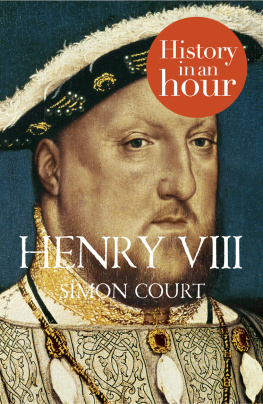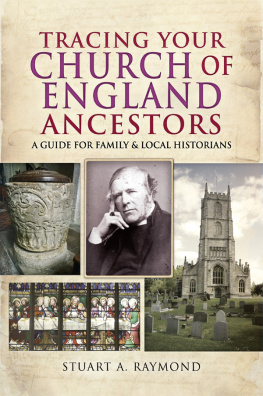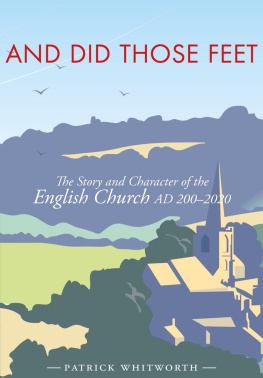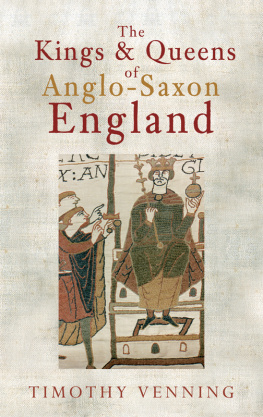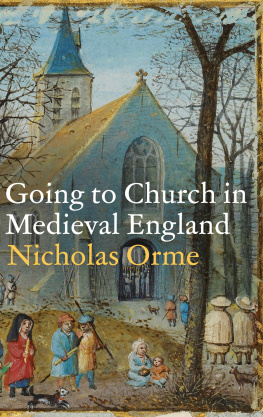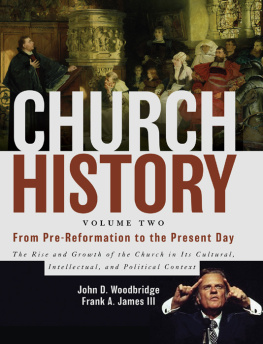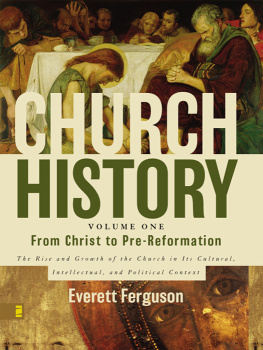A HISTORY OF
THE CHURCH IN ENGLAND
A HISTORY OF
THE CHURCH IN ENGLAND
JOHN R. H. MOORMAN
D.D.. Litt. D
THIRD EDITION

Copyright 1963, 1967, 1973, 1976, 1980
by John Richard Humpidge Moorman
First published in Great Britain by A & C Black, Ltd
Published in the United States by
Morehouse Publishing
P.O. Box 1321
Harrisburg, PA 17105
Morehouse Publishing is an imprint of Church Publishing, Inc.
All rights reserved. No part of this book may be reproduced or transmitted in any form or by any means, electronic or mechanical, including photocopying, recording, or by any information storage and retrieval system, without permission in writing from the publisher.
Moorman, John R. H. (John Richard Humpidge), 1905
A history of the Church in England / John R. H. Moorman.3rd ed.
p. cm.
Originally published: 3rd ed. London : A. and C. Black, 1973.
Includes bibliographical references (p. xxx-xxx) and Index.
ISBN 0-81924 406-X
1. Great BritainChurch history. L Title.
BR743.2.M6 1994
274.2dc20 | 94-6111
CIP |
Printed in the United States of America
08 07 06 15 14 13
PREFACE TO THE THIRD EDITION
In preparing a third edition of this book, I have tried to correct any errors in previous editions and to add, especially in the bibliographies, what seem to me to be the more important works which have been published in recent years. I have also added a new chapter to tell the story of the Church during the last twenty-five years or so. In doing all this I am much indebted to the Rev. J. G. Bishop and to the Rev. Dr. G. R. Selby for their help and advice.
JOHN R. H. MOORMAN
(Bishop of Ripon)
Ripon,
1972
PREFACE TO THE FIRST EDITION
It is notoriously difficult to pour a gallon of water into a pint pot. It is almost as difficult to compress the history of 1750 years into 400 pages. This book, therefore, can be no more than an introduction, a guide to such as are interested in the history of the Christian Church in England and wish to know more about it.
In drawing up this account I have tried to tell it as a story, a narrative of events (based, like other events, on cause and effect) from the first preaching of the Word in England down to the present day. In so doing, a careful selection of facts has had to be made; and I cannot suppose that any other historian would have made the same selection or that my selection will satisfy every reader. That is inevitable. All history that is worthy of the name is biased, because every writer who is a true historian and not a mere annalist, must have a point of view which will inevitably reveal itself in his pages.
In writing a history of the Church in England the historian has to handle subjects of great controversy and diversity of opinion, subjects which are bound up with the deepest emotions and strongest convictions of mankind. What, for example, are we to make of the Reformation? To some the breach with Rome cannot appear otherwise than as a great disaster. Yet to others it may wear the aspect of a providential deliverance, a real sign of progress under the power of the Holy Spirit. So it must be with any kind of history, and especially the history of religion.
I therefore make no claim to be impartial. Indeed, I hope I am not; for impartial history would be very dull.
Historical text-books are almost certain to contain a large number of sweeping statements for which little evidence can be produced simply because there is no space for it. This book contains many such generalizations. But in order to help the reader to follow up any subject in which he is interested I have given references to what I regard as the most useful, reliable and accessible books. These represent, of course, only a small fraction of the literature available; but there are about 800 of them mentioned in the following pages, and most of the 800 will give further references and bibliographies for those who desire them.
I should like to thank the Rev. J. C. Dickinson of Cambridge and Canon Lowther Clarke of Chichester for having read parts of the manuscript, and for their criticisms and suggestions.
JOHN R. H. MOORMAN
Chichester,
1952
CONTENTS
Early traces of Christianity in Britain, Tertullian, S. Alban, British bishops, Traces of buildings.
Pelagius, Germanus, Ninian.
Youth and training, Mission to Ireland, Irish Monasticism.
The British clergy, The Welsh saints.
His life in Ireland, Iona, Missions to the mainland.
S. Gregory the Great, S. Augustines departure, Conversion of Ethclbert, Development of the mission.
Paulinus, Conversion of Edwin, James the Deacon.
S. Felix, S. Birinus.
The death of Edwin, S. Oswald, S. Aidan, S. Hilda, The Celtic Church.
S. Cedd, S. Chad.
The Synod of Whitby, The Scottish Church after S. Cuthbert.
S. Theodore of Tarsus, Early Councils, The Penitentiale
His early life, Becomes a bishop, Evangelizes Sussex, Returns to the North.
The diocese, The parish, Monasteries, Education and learning.
S. Aldhelm, S. Bede, Alcuin.
The stone crosses, Codices, Church-building, Religious poetry.
S. Willibrord, S. Boniface.
Decay of the Church, Councils of Clofeshoh, King Offa.
Early attacks, Danish settlements, S. Edmund.
His love of learning, His schools, His translations.
S. Dunstan, Glastonbury, The Regularis Concordia
Denmark, Norway.
Monastic Life, The dioceses, Synods, Cathedrals, Secular chapters, Parish churches and their priests, Worship, Sermons, Superstition.
The martyrs: Edward and Alphege, King Cnut.
His character and policy, The nationalist party, S. Wulfstan, Westminster Abbey, Invasion of William of Normandy.
William and reform, Stigand, Norman architecture.
Early life of Lanfranc, Canterbury and York, Church Councils, Removal of sees, Courts Christian, Monastic reform.
William Rufus, Anselm and reform, Investitures, Council of Rockingham, Henry I, Anselms theology.
Monasticism under the Normans, Cluniacs, Canons Regular, Gilbertines, Cistercians, Carthusians, Nunneries, Military Orders.
Church and State, Papal legates, Stephen.
Henry II, Benefit of Clergy, Criminous clerks, Thomas Becket, The Constitutions of Clarendon, The Council of Northampton, Becket in exile, His return to England, His martyrdom.
Richard I, Hubert Walter, King John, Stephen Langton, The Interdict, Johns surrender, Magna Carta.
Cathedral schools, The chroniclers, John of Salisbury, Elementary education, The monks and education, Origin of the universities, Oxford, Cambridge, The Seven Liberal Arts, Wall-paintings, Stained glass, Manuscripts.
Papal legates, Papal provisions, Anti-papal feeling, Nationalism, The English bishops and reform.
The Cathedrals, Collegiate churches, Parochial clergy, Vicars, Value of livings, Tithe, Assistant priests, The priests household.
The dioceses, The bishops, Visitations, Legal business.
S. Dominic and S. Francis, The friars reach England, Poverty, The friars and the universities, Friars as preachers, Quarrels between the friars and the seculars.
Occupants of the monasteries, Monks, Novices, Lay-brothers, Servants, Corrodars, Daily time-table, Monastic property, Obedientiaries, Financial affairs, Laxity, Attempts towards reform.
Next page

